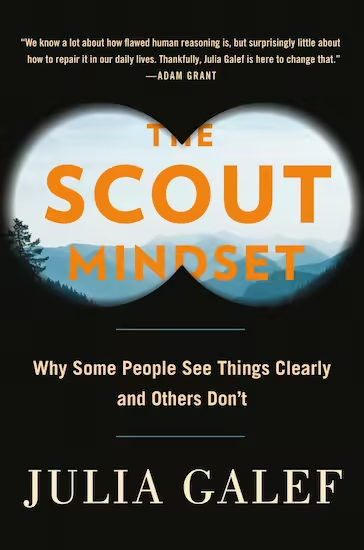Timothy Rice
The Scout Mindset
The first principle is that you must not fool yourself -- and you are the easiest person to fool.

Rating: 4.5/5
– Recommended without hesitation
Read if you:
Want to get better at changing your mind.
The Scout Mindset by Julia Galef introduces the idea that worldviews can be distilled into two primary perspectives: the Soldier and the Scout. The Soldier is defined by loyalty and passion, vigorously defending their intellectual territory against any perceived threats. To a Soldier, information that challenges their position is an attack to be repelled. Conversely the Scout is driven by curiosity and inquisitiveness, striving to develop the most accurate model of reality. For a Scout, new data is not an invasion to be denied but an opportunity to refine their understanding and update their mental map.
As is apparent from the title, Galef argues that the Scout’s mindset is the superior approach in every circumstance. While refuting claims about the superiority of the Soldier, she challenges the reader ask themselves: how can you be sure you’re investigating your beliefs instead of stubbornly defending them?
Two of Galef’s arguments stood out to me while reading this book. The first is about confidence – it is often argued that Soldiers make the best leaders, as a leader needs to display assurance in the face of adversity to inspire their troops. By contrast, a scout’s wishy-washy uncertainty will leave their comrades feeling like they’re passengers on a rudderless vessel, adrift and without direction.
Galef points out that there are actually two types confidence: social and epistemic. Social confidence is how an individual carries themselves, the ease and assurance with which they make their arguments, while epistemic confidence is one’ certainty in their theories and ideas. Galef argues that condemnation of a weak leader is a response to poor social – not epistemic – confidence. It is possible (desirable!) for someone to confidently express low certainty.
My second takeaway from this book is the power of your personal identity as a self-improvement tool. By telling yourself “I am the type of person who changes their mind” and not “I am someone who believes in X”, you can become more comfortable with updating your beliefs in response to new information. This idea is something that I’ve been trying to incorporate since reading Neel Nanda’s blog post on this same topic.
I enthusiastically recommend the The Scout Mindset to anyone who wants to improve their intellectual hygiene and become a more accurate thinker. Although concise, it has plenty of solid and actionable ideas for readers to apply in their everyday lives. I am looking forward to revisiting it again in a few years with fresh eyes to discover new insights and perspectives.
The Scout Mindset on Amazon
The Scout Mindset on Goodreads
My Goodreads Profile